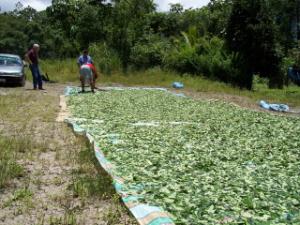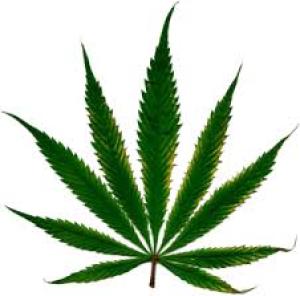The highlights and lowlights of global drug policy in 2018.
One federal agency begins to move on allowing hemp-based CBD products, Florida's legal battle over medical marijuana takes another twist, and more.
A Chicago DEA agent gets caught helping a Puerto Rican drug cartel, an L.A. Customs agent gets convicted of big-time drug trafficking, a Pennsylvania police chief's heroin habit gets him in trouble, and more.
A report from congressional Democrats explores the economic benefits of marijuana legalization, a report from the House Energy and Commerce Committee scolds the DEA and drug distributors over massive shipments of opioids to West Virginia, New York City Mayor Bill De Blasio climbs on board the legalization bandwagon, and more.
Vancouver ponders another cutting-edge drug policy move, Alaska okays on-site marijuana consumption space rules, the president signs the farm bill legalizing hemp, and more.
A Delaware judge says a medical marijuana user fired for failing a drug test can sue his former employer, Arizona public health advocates want the governor to approve needle exchanges, and more.
Marijuana bills aimed at the new year begin popping up, Pennsylvania's highest court rules for pregnant drug users, Russia ponders its own poppy crop, and more.
Federal marijuana prosecutions are dropping as more states legalize, Oregon ponders legal marijuana exports, a South Carolina poll shows strong support for medical marijuana, and more.
(See our Top Domestic Drug Stories of 2018 piece here.)
It's been a year we couldn't wait to put behind us, but as 2018 comes to an end, we can look back on some advances on the international drug policy front, as well as continued brutal and regressive responses from some quarters. Here are 10 of the global drug policy stories that shaped the year, for better or worse:

Iranian drug executions have come to a screeching halt in one of the good news stories of 2018. (handsoffcain.info)
Early this year, it became official: Iran had reformed its death penalty statutes to radically reduce the number of people facing execution for drug offenses, and it had done so retroactively, saving the lives of thousands already on death row. By mid-year, it was clear that the move was having an impact, as human rights observers reported a 99% reduction in drug executions, with only one person being executed for drugs as of June, compared to more than a hundred during the same period in 2017.
2. Canada Becomes the First G8 Country to Legalize Marijuana
Justin Trudeau pledged that he was elected prime minister, his government would legalize marijuana. It didn't happen as fast as he would have liked, but the Liberals' legalization bill passed parliament in June and went into effect on October 17. So far, the sky has not fallen.
3. Medical Marijuana Earns Growing Acceptance
The year began with Thailand announcing a plan to allow medical marijuana and ended with Thailand approving it and becoming the first Southeast Asian country to do so. But in the meantime, Israeli pharmacies began selling medical marijuana in April, Zimbabwe legalized it in May, and Portugal and Luxembourg followed suit in June. In November, Great Britain joined the club, and Greece issued its first medical marijuana production licenses. Late in the year, in South Korea, the National Assembly approved an amendment to the country's drug laws that will pave the way for the use of medical marijuana by prescription, and New Zealand also approved it in December Not a bad year for medical marijuana.

Canadian Senate
The bloody drug war of Philippines President Rodrigo Duterte continued apace in 2018, with a death toll now put at 12, 000 (20,000 by some estimates), but Duterte has come under increasing pressure both domestically and internationally. In February, both Amnesty International and Human Rights Watch aimed broadsides at the Philippines even as the International Criminal Court began "preliminary examinations" of whether there is sufficient evidence to bring a case before the court. In March, activists called out drug war human rights abuses at the embassy in Washington, DC. By July, an unbowed Duterte was vowing to continue a "relentless and chilling" drug war even as national human rights groups said he was using it as a cover for assassinating political opponents. In September, he unleashed an attack on a second drug war critic, Senator Antonio Trillanes, after last year imprisoning critic Senator Leila de Lima on trumped up drug charges. She is still imprisoned.
5.. ...and the Rot Spreads in the Region
Following the lead of the Philippines, other countries in the region have also embraced drug war thuggery and human rights abuses. In May, the Bangladeshi opposition warned of a wave of police killings of drug suspects, and within weeks, more than a hundred were killed and 20,000 arrested, even as evidence emerged that the crackdown was being used to hide political assassinations. The situation was fraught enough that the UN human rights head and even the US State Department expressed concern. Drug war killings were also reported in Indonesia, although there were mixed signals about moves toward reforms there, and Sri Lanka vowed to begin hanging drug dealers. Paradoxically though, a Malaysian court's imposition of a death sentence on a man for providing cannabis oil to patients now appears to have resulted in a moratorium on the death sentence and could end the death penalty in its entirety in the county.
6. The US President Aligns Himself With Global Drug War Authoritarians
President Donald Trump was a baleful presence on the global drug policy stage this past year, sympathizing with drug war authoritarians such as Philippines President Rodrigo Duterte and Turkish Prime Minister Erdogan, as well as drug death penalty countries such as China and Singapore. He said early in the year he wants to execute all drug dealers and admires the Singapore approach (mandatory death penalty for drug trafficking), a statement that moved more than 150 organizations to condemn his call. At year's end, he was singing a similar tune with a ghoulish call for more Chinese drug executions. In between, he went to the United Nations to try to gin up a reinvigorated global drug war.

coca leaves drying by highway
In a case brought by three marijuana users, the country's Constitutional Court ruled that the private possession, cultivation, and consumption of marijuana is legal. "It will not be a criminal offense for an adult person to use or be in possession of cannabis in private for his or her personal consumption," Deputy Chief Justice Raymond Zondo wrote in his ruling. It will, however, remain illegal to use cannabis in public and to sell and supply it. The ruling did not set allowable quantities, with the court saying parliament had two years to come up with a new law that reflected the ruling.
8. Glimmers of Hope in Mexico
then-President Felipe Calderon unleashed the latest chapter of the country's drug wars, bringing violence to levels not seen before in the country, Mexico is showing signs it is ready for change. The death toll from prohibition-related violence is higher than ever, and that is impelling a psh for change, most notably with the election of Andres Manuel Lopez Obrador, who is very open to finding exits from the drug war, whether it's legalized opium production in Guerrero, granting amnesty for non-violent drug trafficking offenders, or legalizing marijuana. And speaking of legalizing marijuana, the Mexican Supreme Court in November struck down the ban on marijuana possession, cultivation, and use. Now, Lopez Obrador's governing MORENA Party has filed a bill to legalize marijuana sales. Tackling the violence, may be a bit more difficult.
9. Colombia Sees a Record Coca Crop as US Cocaine Deaths Rise
Efforts to reduce coca cultivation and cocaine production in the country after the peace agreement with the FARC rebels have not gone well, and that's causing rising worry in Washington. In June, the UN Office on Drugs and Crime reported that 2017 production was at an all-time high, prompting expressions of concern from the drug czar's office and support from President Trump for new rightist Colombian President Ivan Duque's "head-on fight against drug trafficking." That could include a renewed resort to aerial fumigation, even drones, as well as forced eradication of coca crops, leading to renewed conflict in cultivation zones. Meanwhile, cocaine is now the third leading cause of drug overdose deaths, trailing only fentanyl and heroin.

Vienna International Centre, home to the UN drug agencies
In June and again in November, the Expert Committee on Drug Dependence (ECDD) of the World Health Organization (WHO) met to consider the evidence on cannabis (marijuana) and its placement in the UN drug scheduling system, which determines whether or what level of control the UN drug conventions mandate that countries maintain for the substance. The conventions specify that substances should receive such an evaluation before being scheduled, but that never happened for marijuana. Observers believe the process should lead to marijuana being moved to a less restrictive schedule than it is in currently -- if the Commission on Narcotic Drugs (CND) votes to adopt such a recommendation from ECDD.
That didn't happen when, earlier this month, WHO voted to delay release of ECDD's recommendations until January, for unexplained reasons. That may mean they get taken up at the main annual CND meeting in Vienna in March, rather than December's intersessional. The delay seems unusual, and probably political, but its intent is unclear.
The next few months may tell. In the meanwhile, ECDD says that CBD shouldn't be scheduled at all. But that didn't stop the US FDA from saying that treaties require it be scheduled, even though they also think it shouldn't be.
back to top
One federal agency begins to move on allowing hemp-based CBD products, Florida's legal battle over medical marijuana takes another twist, and more.

MMJ leaf and stethoscope KY ODCP_151_198.jpg
FDA Begins Process of Allowing Hemp-Based CBD Products. After President Trump signed the 2018 farm bill into law Thursday, the Food and Drug Administration (FDA) issued a press release pledging to pursue means of allowing businesses to legally market products containing hemp or non-psychoactive cannabinoids, such as CBD. FDA also asserted its right to regulate such products. "In view of the proliferation of products containing cannabis or cannabis-derived substances, the FDA will advance new steps to better define our public health obligations in this area," FDA Commissioner Scott Gottlieb said. "We'll also continue to closely scrutinize products that could pose risks to consumers."
Delaware
Delaware Judge Rules Fired Medical Marijuana User Can Sue Former Employer. A factory worker fired from his job after failing a drug test can sue his former employer, Superior Court Judge Noel Primos ruled on Monday. Jeremiah Chance claims his firing violated the anti-discrimination provision of the state's medical marijuana law and that he was targeted for retaliation after pointing out safety issues with railroad ties manufactured by the Kraft Heinze plant in Dover. The company had argued that the anti-discrimination clause was preempted by the federal Controlled Substances Act, but the judge disagreed. The law does "not require employers to participate in an illegal activity... but instead merely prohibits them from discriminating based upon medical marijuana use," Primos wrote.
Florida
Florida Legal Battle Over Medical Marijuana Takes Another Turn. A state appeals court this week agreed to stay a circuit court judge's ruling that the legislature and the Department of Health violated the state's voter-approved medical marijuana amendment. The ruling comes in a case involving a Tampa marijuana grower, which challenged caps placed on the number of medical marijuana licensees. While the 1st District Appeals Court approved the stay, it also said its final decision on the case would be "expedited."
Oregon
Oregon to Allow Medical Marijuana Deliveries in Areas That Ban Dispensaries. State regulators have approved medical marijuana deliveries in areas where dispensaries are banned effective December 28. The rules were approved last week after patient advocates voiced concern about rules that limited access to medical marijuana.
South Carolina
South Carolina Poll Has Strong Support for Medical Marijuana. A new poll from Benchmark Research finds that nearly three-quarters of South Carolinians are ready for medical marijuana. The poll had support at 72%, with even 63% of Republicans behind it. Medical marijuana bills last year won some committee votes, but were unable to advance.
[For extensive information about the medical marijuana debate, presented in a neutral format, visit MedicalMarijuana.ProCon.org.]
back to top
A Chicago DEA agent gets caught helping a Puerto Rican drug cartel, an L.A. Customs agent gets convicted of big-time drug trafficking, a Pennsylvania police chief's heroin habit gets him in trouble, and more.
In Elizabeth Borough, Pennsylvania,
the former police chief was arrested December 19 for stealing thousands of baggies of heroin from the department's evidence room. Timothy Butler, 42, was the police chief until the day of his arrest, when he resigned. Butler went down after officers complained he was interacting with a person who possessed heroin and that person told investigators he was making controlled drug buys for the chief, which investigators found unlikely. When confronted, Butler admitted the thefts and said he was addicted. He is charged with theft, obstruction of justice, drug possession, and prohibited acts.
In Chicago, a DEA agent was arrested December 20 for allegedly helping a Puerto Rico-based drug trafficking organization. Agent Fernando Gomez, 41, a former Evanston, Illinois, police detective, joined the DEA to help further a "narcotics conspiracy," prosecutors said. While still with the Evanston Police, Gomez sent guns obtained from drug dealers to a Puerto Rican man who is a member of La Organizacion de Narcotraficantes Unidos. He is also accused of helping the group smuggle drugs into New York. He faces federal drug, conspiracy, and firearms charges.
In Yulee, Florida, a former Georgia narcotics officers was arrested on December 20 on charges he was leading a meth distribution ring. Jason Kelly Register, a former Camden County Sheriff's Office and Darien Police narcotics officer, went down as part of a joint state-federal undercover investigation into meth trafficking in the area and was arrested along with 29 others. Department in McIntosh County. He is charged with conspiracy to traffic methamphetamine, sale of methamphetamine, and using a firearm in furtherance of a drug trafficking crime.
In Los Angeles, a federal customs agent was convicted December 15 of hiring a trucker to smuggle large quantities of drugs from Los Angeles to Chicago. Customs and Border Protection Agent Manuel Salas, 52, a 25-year veteran of the department, went down after the trucker was stopped in New Mexico and drugs were discovered. He then implicated Salas and his wife, who was found guilty of money laundering for accepting cash deposits for the drugs from the trucker. Salas himself was convicted of drug trafficking and conspiracy charges. He's looking at a minimum of 10 years in federal prison.
In Atlanta, a former state prison guard was sentenced December 21 to seven years and eight months in federal prison for taking money from an inmate to smuggle meth and marijuana into the Hays State Prison. Tiffany Cook, 34, went down after another inmate ratted her out and she was searched as she arrived at work. Prison officials found 118 grams of meth and 150 grams of marijuana inside her bra and vagina. She pleaded guilty to drug trafficking and introducing contraband into a prison.
back to top
A report from congressional Democrats explores the economic benefits of marijuana legalization, a report from the House Energy and Commerce Committee scolds the DEA and drug distributors over massive shipments of opioids to West Virginia, New York City Mayor Bill De Blasio climbs on board the legalization bandwagon, and more.
Marijuana PolicyCongressional Democrats Release Report On Marijuana Legalization's Economic Benefits. Democratic members of the congressional Joint Economic Committee released a report Tuesday emphasizing the economic benefits legal marijuana can bring at both the state and federal levels. The report is The National Cannabis Economy, and it predicts marijuana sales revenues will jump from $8 billion last year to $23 billion by 2022. "It's time we legalize marijuana, but at the minimum, we must reduce the conflicts between federal and state laws so that the industry can continue to create jobs and bolster state economies," Senator Martin Heinrich, (D-NM), the ranking member of the panel, said in a press release. "This conflict hurts small businesses and constrains the economic benefits of legal cannabis -- an industry that is estimated to reach $11 billion in sales this year and $23 billion by 2022. But in order to realize the benefits, we must act on legislation such as the STATES Act to help these businesses thrive."
West Hollywood, California, Approves Cannabis Cafes, Consumption Lounges. The city announced Wednesday that it had approved licenses for eight edibles-only consumption cafes an eight consumption lounges where marijuana can be smoked, vaped, drunk, or eaten. The businesses now have a year to obtain a West Hollywood business license and a place to operate. The move could nearly double the number of consumption lounges nationwide: there are seven such facilities in San Francisco, one in Oakland, and one in Denver.
New York City Mayor Backs Marijuana Legalization. Just days after Gov. Andrew Cuomo (D) said he wants to legalize marijuana next year, New York City Mayor Bill De Blasio hopped on board the legal pot train, saying it represents "a once-in-a-generation opportunity to get a historic issue right for future New Yorkers." De Blasio's remarks came as the Mayor's Task Force on Cannabis Legalization released a report recommending that the city tax sales, automatically expunge old pot possession offenses, and work to ensure "diverse participants" get a shot in the legal industry.
Brooklyn, New York, District Attorney Throws Out Hundreds of Old Pot Convictions. Brooklyn DA Eric Gonzales appeared in court Wednesday to vacate outstanding warrants related to low-level pot offenses, as well as expunging past misdemeanor pot convictions. "To fail to address these past convictions would be hypocritical and it would be to turn a blind eye on all the harm caused by marijuana enforcement in prior years," Gonzalez said.
Pennsylvania Governor Suggests He Could Get Behind Marijuana Legalization. Gov. Tom Wolf (D) said Wednesday that it's time for the state to consider legalizing marijuana. "More and more states are successfully implementing marijuana legalization," he noted, adding that it's time for "a serious look" at doing it. The statements mark a change of heart for Wolf, who previously had shied away from legalization talk.
Medical Marijuana
Florida Legal Battle Over Medical Marijuana Takes Another Turn. A state appeals court this week agreed to stay a circuit court judge's ruling that the legislature and the Department of Health violated the state's voter-approved medical marijuana amendment. The ruling comes in a case involving a Tampa marijuana grower, which challenged caps placed on the number of medical marijuana licensees. While the 1st District Appeals Court approved the stay, it also said its final decision on the case would be "expedited."
Heroin and Prescription Opioids
Congressional Report Scolds DEA, Drug Distributors on Flood of Opioids to West Virginia. Massive shipments of prescription opioids to West Virginia -- 20.8 million pounds opioids sent to one town of 3,000 over a ten-year period, for example -- reflect failures by the DEA and drug distribution companies to conduct effective oversight of their customers and failures to recognize obvious red flags, a bipartisan report from the House Energy and Commerce Committee found. These lapses helped make the state "the epicenter of the nation's opioid epidemic and the state with the highest drug overdose death rate in the country," the report said. And it's not just West Virginia: "Taken all together, the Committee's report outlines a series of missteps and missed opportunities that contributed to the worsening of the opioid epidemic in West Virginia," the report said. "While focused on a narrow part of West Virginia, the report raises grave concerns about practices by the distributors and the DEA nationwide."
back to top
Vancouver ponders another cutting-edge drug policy move, Alaska okays on-site pot consumption space rules, the president signs the farm bill legalizing hemp, and more.

From Amsterdam to Alaska? Dutch-style on-site consumption spaces win approval in Juneau. (Creative Commons)
Alaska Approves Rules for On-Site Marijuana Consumption. The state's Marijuana Control Board on Thursday approved rules for businesses that want to offer on-site consumption of pot products. Now, businesses that want in will have to apply for a special onsite use endorsement and come up with plans for meeting ventilation and other standards for on-site use. This makes Alaska the first state to develop a regulatory framework for on-site use at the state level.
Medical Marijuana
FDA Begins Process of Allowing Hemp-Based CBD Products. After President Trump signed the 2018 farm bill into law Thursday, the Food and Drug Administration (FDA) issued a press release pledging to pursue means of allowing businesses to legally market products containing hemp or non-psychoactive cannabinoids, such as CBD. FDA also asserted its right to regulate such products. "In view of the proliferation of products containing cannabis or cannabis-derived substances, the FDA will advance new steps to better define our public health obligations in this area," FDA Commissioner Scott Gottlieb said. "We'll also continue to closely scrutinize products that could pose risks to consumers."
Industrial Hemp
Trump Signs Farm Bill, Final Step to Making Hemp Legal. President Trump signed the 2018 farm bill into law Thursday, the final step in the legalization of hemp. The hemp provision of the farm bill, championed by Senate Majority Leader Mitch McConnell (R-KY), received bipartisan support and now ends a ban going back more than seven decades.
Drug Testing
Federal Appeals Court Upholds Florida School District's Suspicionless Drug Testing of Substitute Teachers. A three-judge panel of the 11th US Circuit Court of Appeals has rejected a constitutional challenge to the Palm Beach County School Board's policy requiring substitute teachers to undergo suspicionless drug testing. Federal courts have generally held drug testing to be a search under the Fourth Amendment and barred drug testing by government entities, but have carved out exceptions for students, people involved in safety-sensitive positions, and law enforcement personnel. Although this case doesn't appear to fall into any of those categories, the appeals court nonetheless ruled in the district's favor. "We think that the School Board has a sufficiently compelling interest in screening its prospective teachers to justify this invasion of the privacy rights of job applicants, and thus conclude that the School Board has not violated the constitutional mandate barring unreasonable searches and seizures," said the 54-page opinion, written by Judge Stanley Marcus and joined by Chief Judge Ed Carnes and Judge David Ebel. "As we see it, ensuring the safety of millions of schoolchildren in the mandatory supervision and care of the state, and ensuring and impressing a drug-free environment in our classrooms, are compelling concerns."
International
Vancouver Looks to Pioneer "Safe Supply" for Hard Drug Users. The city council met Thursday to discuss the Mayor's Overdose Emergency Task Force report and how and whether to implement its 23 specific recommendations for action. One key recommendation is to find a location in or near the epicenter of the city's Downtown Eastside hard drug scene for "a clinical space where we could evaluate and enroll people" for a "low-barrier dispersal program for pharmaceutical opioids." Supporters are using the phrase "safe supply" to describe the concept aimed at reducing skyrocketing overdose deaths linked to illicit fentanyl.
back to top
A Delaware judge says a medical marijuana user fired for failing a drug test can sue his former employer, Arizona public health advocates want the governor to approve needle exchanges, and more.
Marijuana PolicyIncoming House Rules Committee Chairman Becomes Cosponsor of Marijuana Justice Act. What a difference an election makes! Outgoing House Rules Committee Chair Pete Sessions (R-TX) reliably blocked any marijuana reform legislation, but things are going to be different under incoming Chair Jim McGovern (D-MA). McGovern has already said he is "not going to block marijuana amendments like my predecessor has done," and now he has just signed on as a cosponsor of the Marijuana Justice Act (HR 4815).
Indiana Governor Not Down With Marijuana Legalization. Gov. Eric Holcomb (R) has made it clear he will oppose any legislative moves to legalize marijuana. "I'm just not willing to look at that, especially since it is illegal right now according to the federal government," Holcomb said.
South Dakota Marijuana Legalization Initiative Filed. Attorney General Marty Jackley (R) has filed a statement on the language of an initiative to legalize marijuana, the first step in the process of getting the measure on the ballot. According to the attorney general's statement, the measure would allow anyone 21 and over to grow, possess, use, and sell marijuana. Localities would be barred from taxing or regulating marijuana businesses. And, the attorney general says, "it forbids prosecutions for driving under the influence of ingested marijuana," but the language of the initiative only bars prosecution for "consumed cannabis metabolites."
Medical Marijuana
Delaware Judge Rules Fired Medical Marijuana User Can Sue Former Employer. A factory worker fired from his job after failing a drug test can sue his former employer, Superior Court Judge Noel Primos ruled on Monday. Jeremiah Chance claims his firing violated the anti-discrimination provision of the state's medical marijuana law and that he was targeted for retaliation after pointing out safety issues with railroad ties manufactured by the Kraft Heinze plant in Dover. The company had argued that the anti-discrimination clause was preempted by the federal Controlled Substances Act, but the judge disagreed. The law does "not require employers to participate in an illegal activity... but instead merely prohibits them from discriminating based upon medical marijuana use," Primos wrote.
Oregon to Allow Medical Marijuana Deliveries in Areas That Ban Dispensaries. State regulators have approved medical marijuana deliveries in areas where dispensaries are banned effective December 28. The rules were approved last week after patient advocates voiced concern about rules that limited access to medical marijuana.
Drug Testing
Utah Bill Would Criminalize Using Fake Urine to Pass Drug Tests. Under a bill already approved by an interim legislative committee, it would be "a criminal offense to distribute, possess, or sell an adulterant or synthetic urine;" or "to defraud an alcohol or drug test using an adulterant, bodily fluid of another person, or bodily fluid expelled or withdrawn before collection for the test." The measure would make violations a misdemeanor.
Harm Reduction
Arizona Public Health Advocates Urge Governor to Legalize Needle Exchange Programs. In a letter delivered last week to Gov. Doug Ducey (R), more than 30 organizations involved in public health and addiction recovery called on him move to legalize the proven harm reduction intervention. "Arizona has fallen behind in its response to this national crisis, states like North Carolina, Indiana, and Kentucky have all implemented syringe service legislation and are seeing the benefits in their communities," the letter says. "Too many lives are on the line to continue with the status quo."
back to top
Marijuana bills aimed at the new year begin popping up, Pennsylvania's highest court rules for pregnant drug users, Russia ponders its own poppy crop, and more.

Citing sanctions from the West, Russia is moving to grow its own medicinal poppy crops. (UNODC)
New Hampshire Legalization Bill Ready to File. A group of state lawmakers have agreed on language for a bill that would allow for legal marijuana commerce and let adults possess up to an ounce of weed and grow up to six plants. The bill has not yet been formally filed. Legalization efforts in previous years have been thwarted in the Republican-dominated legislature, but Democrats retook control in the November elections, Still, Republican Gov. Chris Sununu has vowed to veto any legalization bill that reaches his desk.
Virginia Decriminalization Bill Ready to Go. When the legislature convenes next week, it will have a decriminalization bill waiting for it. Sen. Adam Ebbin (D-Alexandria) has pre-filed SB 997, which would decriminalize the possession of up to a quarter-ounce of weed and provide for a maximum $50 civil penalty. Under current state law, getting caught with a joint carries a jail sentence of up to 30 days and a $500 fine. Similar bills have been filed in previous sessions, but never made it out of committee.
Pregnancy
Pennsylvania High Court Rules Drug-Using Pregnant Women Can't Be Charged With Child Abuse Under State Child Protection Law. In an opinion issued last Friday, the state Supreme Court held that the state's child protection law does not apply to pregnant women. The court ruled that the law doesn't include fetuses or unborn children and said victims protected by the law must be children.
International
Russia Moves Towards Allowing Medicinal Opium Crops. The Russian government last week approved a draft bill that would allow the country to produce medicinal opium crops. Government officials said the bill was needed to reduce its dependence on foreign countries that supply raw opium to government factories because some of those countries have imposed sanctions on the country. "In order not to leave our population without strong painkillers, we must be self-sufficient," health minister Veronika Skvortsova told reporters. "We need to produce drugs in a full cycle -- from substances to their medicinal form." The bill still needs to be approved by parliament and signed into law by President Vladimir Putin.
Thai Government Approves Medical Marijuana, Kratom. The Thai ruling junta last week approved a bill legalizing medical marijuana, becoming the first country in Southeast Asia to do so. The bill also regularizes the status of kratom, which comes from there. The bill becomes law once it is approved by the monarchy.
back to top
Federal marijuana prosecutions are dropping as more states legalize, Oregon ponders legal marijuana exports, a South Carolina poll shows strong support for medical marijuana, and more.

marijuana purple shant shantis favorites 2 flickr_12.jpg
Federal Marijuana Prosecutions Are Declining. In a year-end report from the Supreme Court, Chief Justice John Roberts noted that while overall drug prosecutions increased during Fiscal Year 2018, marijuana prosecutions were down. "Drug crime defendants, who accounted for 28 percent of total filings, grew two percent, although defendants accused of crimes associated with marijuana decreased 19 percent," Roberts wrote.
New York Governor Vows Marijuana Legalization in Inaugural Address. Gov Andrew Cuomo (D) used his inaugural address Tuesday to reiterate his support for legalizing marijuana. "When they write the history books and ask what did we do -- in the face of anger and division, when people were disillusioned, let New York's answer be that in this defining moment we brought healing and light and hope and progress and action," he said. "That New York led on legalizing recreational marijuana, bringing justice and new economic opportunity not for rich corporations, but for the poor communities that paid too high a price for too long." He also promised to propose "the most progressive agenda this state has ever seen, period" within a hundred days, and included marijuana legalization as part of that.
Oregon Ponders Becoming First State to Export Legal Marijuana. The Craft Cannabis Alliance, led by Adam Smith, is working with legislators on a plan to let the state start exporting marijuana to other legal pot states by 2021. Under draft language for a proposed bill, the state would allow wholesalers to ship across state lines to other legal pot states once the governor had signed a pact with the importing state to allow those deliveries. But any proposed bill to allow such sales faces obstacles at the federal level, where marijuana is still illegal.
Medical Marijuana
South Carolina Poll Has Strong Support for Medical Marijuana. A new poll from Benchmark Research finds that nearly three-quarters of South Carolinians are ready for medical marijuana. The poll had support at 72%, with even 63% of Republicans behind it. Medical marijuana bills last year won some committee votes, but were unable to advance.
back to top










